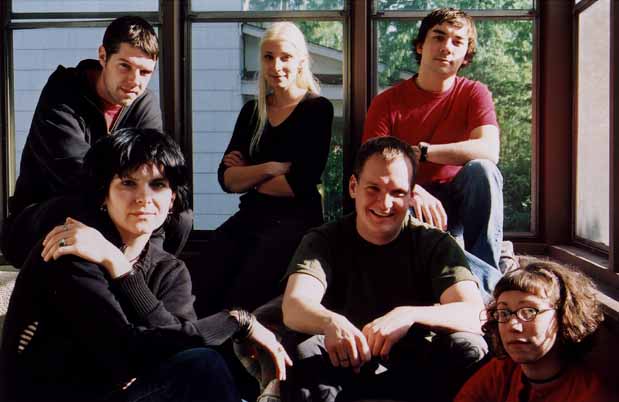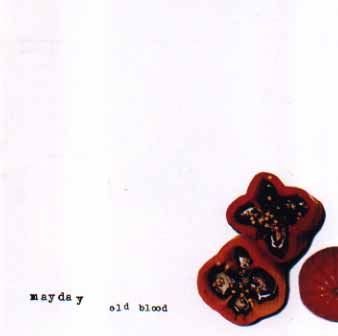|

Mayday:
Beyond a Lullaby
story by tim mcmahan
|
|
|
Lazy-i: June 12, 2002
|
Catching up
with Ted Stevens isn't easy.
Stevens has
been a busy guy, dividing his time as a guitarist for Omaha rock
band Cursive while leading his own project, Mayday, not to mention
briefly filling in on bass earlier this year in Tim Kasher's other
rock band, The Good Life.
"I'm desperately
in need of a break, but I can't stand still," said Stevens
June 5, only days after getting back from a fun but brutal Mayday
/ The Good Life / Bright Eyes tour, and only a day away from hitting
the road again on a three-week Cursive West Coast tour (which would
end up being cancelled when Cursive frontman Kasher suffered a collapsed
lung).
"It's really affected
my brain in the past year," Steven said. "The momentum
is there and you long for a different city every night and hitting
the interstate. Coming home is hard; leaving is easier. But at the
same time, you feel the wear and tear. Tim and I have been gone
so much between the two bands that it's not even worth having a
home. Then you get this feeling of total displacement, having no
place to put your feet up."
Stevens had planned to
look for an apartment between Cursive's West Coast tour, which was
slated to end in late June, and the band's tour of Japan in mid-July.
Now with Kasher out, Stevens will get an extended break, whether
he likes it or not. His hectic lifestyle is in pointed contrast
to the ethereal, rustic, paint-faded music he creates with his band,
Mayday, his latest project in a long, successful string that includes
the gone-but-not-forgotten Lullaby for the Working Class, a band
whose ashes Mayday rose from.
"This project grew
out of the most prolific time for Lullaby, around 1997 and '98,
when we were in a lull releasing our second record and writing our
third, " Stevens said of Mayday. "There was a ton of material
that we never released. I was writing stuff that wasn't pop, but
more experimental and noise-oriented, a lot different than Lullaby."
|
|
|
But
Lullaby fans will likely view Old Blood, Mayday's just-released
debut on Saddle Creek Records, as merely the reincarnation of that
seminal band. In addition to including core Lullaby members A.J.
and Mike Mogis, Mayday also follows in Lullaby's diverse instrumental
footsteps, sporting guitars, vibes, strings and banjo, along with
a cast of guest vocalists. But at the center of it all is Stevens
and his unique style of songwriting that bends the limits of acoustic
sound, taking traditional melodies and forcing them into experimental
settings that are at once familiar and disquietingly dissonant,
soothing and uncomfortable.
Missing, however, is
the last core Lullaby member, drummer Shane Aspergren, who lives
in Paris. Stevens said when Mayday is on the road, it's Lullaby
that the fans remember him by. "The unanswered questions (about
Lullaby) have bothered those fans," he said. "I'm a prankster
or trickster at heart and I've always been elusive with an answer.
I have high hopes that Shane will come back in country some time.
But if we played together again, I can't say that it would be Lullaby
for the Working Class. It's a different era, so it would be a different
band."
Whatever happened to
Lullaby has long been an unanswered question. After releasing three
critically acclaimed albums on Bar/None, three EPs on Saddle Creek
and a Rykodisc Europe 4-song EP, the band unceremoniously faded
away after their last full-length, Song, came out in 1999.
Stevens said he's played an active role in perpetuating the band's
mysterious end.
"We just never made
a decision on doing a fourth album, and by doing that, I guess I
made a decision," Stevens said. "As far as Lullaby disappearing
into the ether, I guess that was my goal. It became clear that most
of the band was moving to Chicago or abroad, and people were getting
married and having normal lives. November 1999 saw the band decaying
and I made up my mind that if Lullaby went on hiatus, it would be
very non-spoken and I would let that mystery hang, if only for the
drama."
Stevens said the process
of putting together what turned out to be Lullaby's swansong recording
also contributed to the band's demise. "At the end of the Song
record, there was a lot of disagreement about how to approach the
singing and writing between me and the label and the people working
overseas," he said. "What it came down to is that I cracked
under the pressure and had a really terrible experience finalizing
the record. The end result was that it was our best record by far,
but the process was excruciating."
In addition to friction
in the studio, Stevens said it was evident that the band was about
to be dropped by its label. "I found out later that the label
was bought out and had to live up to a different standard,"
he said, "but I still took it personally. 1999 was my belated
coming of age, and as a writer, I fell apart totally and couldn't
write songs anymore."
It took joining Cursive
as a second guitarist and vocalist in the summer of '99 to get him
out of his funk. "Watching them work together helped me,"
Stevens said. "I needed to see them writing songs. Writing
is an inherit skill that you don't forget, you just have to take
a break from it."
|

|
"November
1999 saw the band decaying and I made up my mind that if Lullaby
went on hiatus, it would be very non-spoken and I would let
that mystery hang, if only for the drama."
|
|
|
|

|
"I
cracked under the pressure and had a really terrible experience
finalizing the record. The end result was that it was our
best record by far, but the process was excruciating."
|
|
|
Through
it all, Stevens continued his "Mayday" project, which
he calls a "fly by the seat of your pants band" that played
only on special occasions, specifically on May 1 every year for
the past six years. In addition to the Mogis brothers, the "cast"
on Old Blood also includes Matt Silcock, John Kotchian, and
Tiffany Kowalski, along with Cursive cellist Gretta Cohn, Azure
Ray's Orenda Fink and Maria Taylor, Now It's Overhead's Andy Lemaster,
Bright Eyes' Conor Oberst and Dark Town House Band's Renee Ledesma
Hoover (Bill Hoover also took part on the recordings, but ended
up on the cutting room floor).
The guest support adds
color to a recording washed in somber tones, soothing arrangements
and Stevens' hushed, breathy vocals. Oberst lends his youthful,
jagged voice to the up-tempo, flamenco-flavored "Confession,"
a song Stevens said he wrote for Oberst during a brief time when
he lived with him. "It's one friend singing to another about
songwriting," Stevens said. "When I'm singing it, I'm
singing to him, and when he's singing it, he's singing to me."
Stevens said Azure Ray
helped pull together ideas on "Come On," the lilting,
cloudy rocker that also features A.J. Mogis on harmonies. Maria
Taylor adds her distinctive harmonies on the quiet, acoustic "I
Know Moonlight," while the mysterious, grotto-low voice on
"Captain," is actually Stevens doing his best "Lay
Lady Lay" Bob Dylan impression. "The intent with Mayday
was to hide my identity, to have mystery behind it and not have
the limelight on me as a singer/songwriter," Stevens said.
"I wanted to blend into the background and make this more of
a project."
He said the nature of
the collaboration was both ordered and random. "There was a
lot of form and structure behind assembling the record, and a lot
of accidental shit," Stevens said.
There was little choice,
however, in having the Mogis brothers involved with the CD's production.
"That's become a Saddle Creek standard," Stevens said.
"If I had chosen another producer, I don't think Saddle Creek
would have put it out. When I was writing it, they weren't involved.
I sat in the studio for a week while A.J. was at the controls and
had different players come in, along with all the guest singers.
Mike didn't start working on the project until late summer. He did
overdubs and mixed it down. Both were very important processes."
There's always a certain
amount of mystery as to how much the Mogis brothers add to any Saddle
Creek recording beyond their traditional production. Stevens said
while Mike Mogis is integral to the band's sound, his contribution
comes with a price. "I find it kind of frustrating because
Mike can't tour," he said. "How can I go on the road and
support the CD without him? We still managed to put a band together
and tour, and succeeded with flying colors."
Just as Bright Eyes is
a constantly changing band centered around singer/songwriter Conor
Oberst, Stevens said Mayday's touring band also will be ever-changing,
as will the band's approach to recording.
"I'm working on
the next record now, and as far as writing goes, it's more traditional,
minimalist and country folk," Stevens said. "It will be
more of a solo project than anything -- I don't hear drums or guitar
melodies, just sparse vocals, guitar and mandolin. I'm going to
ask A.J. to play piano and Mike to play Dobro guitar, and keep the
recording confined to kitchens, laundry rooms and basements rather
than have a lush studio sound. People today slug it out four and
five times and take pro tools and auto-tune the vocals. The recording
process used to be more natural and performance-based, leaving in
the little mistakes and oddities."
Stevens said his goals
with Mayday are different than with Lullaby, where the dream was
to eventually get a publishing deal. "We were led along for
a long time, all the way to the point where we were at PolyGram,
face-to-face with a guy offering a deal," Stevens said. "I
feel a lot more comfortable where I am today, and a publishing deal
isn't something I look for anymore. The goal was to get Saddle Creek
to get me to this level and let me do the rest."
So with the success of
other Creek acts such as The Faint, Cursive and Bright Eyes, is
there pressure for Mayday to be just as prominent in the indie music
world? Stevens says the pressure is only in his mind. "I feel
the pressure to go out and support the record," he said. "But
I don't intend to achieve Bright Eyes status."
Regardless, he said it's
inspiring and a little intimidating when he sees the following Saddle
Creek bands have generated on tour, especially compared to the label's
meager beginnings, which Stevens said takes him back to the first
Lumberjack tapes in '93. "There's a lot more of everything,
especially people," he said. "We've amassed this huge
base of people who travel with and meet us on the road. As of late
it's gotten out of hand. There's a posse in every town of former
Omahans or friends of the family and the bands. That's really changed
over the years. It's sometimes hard to know how to deal with it,
but it's even harder to deal without it."
The label's success continues
to be a source of surprise. "I'm still in denial," Stevens
said. "Every time we have a great show I'm amazed and say,
'Holy shit, this is really coming together easy.' It's definitely
affected all of our writing. It's made us more determined. Working
with everyone and seeing them develop as writers and players makes
you want to do your best. Everyone wants to keep getting better,
and that's where we're all at -- trying to write better songs."
Back to 
Published in The Omaha Weekly June 20, 2002. Copyright © 2002
Tim McMahan. All rights reserved.
|
|
| |
|
|
|

![]() webboard
interviews
webboard
interviews